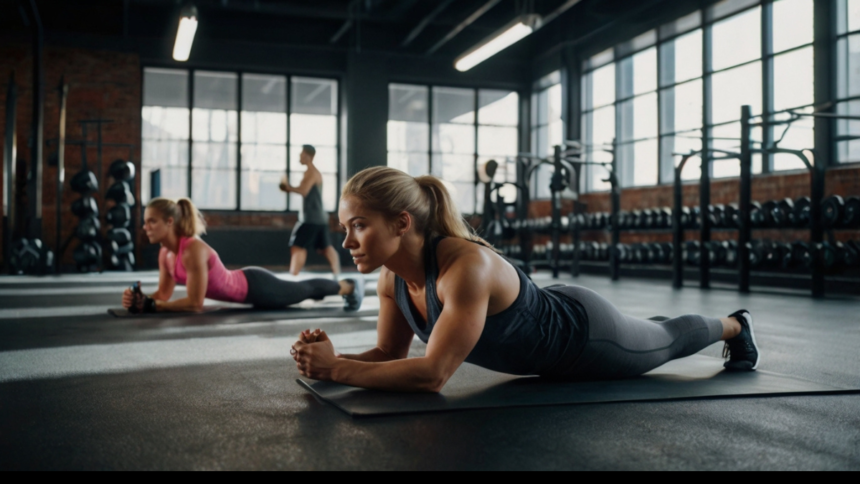Core exercises are super important for everyone, no matter how fit you are. They help strengthen your stomach and back muscles, which makes it easier to do everyday activities. Whether you are just starting out or have been working out for a long time, there are core exercises that can fit your level. This article will cover some of the best core exercises that you can try, along with tips to help you get the most out of your workouts.
Key Takeaways
- Core exercises help improve balance and stability.
- You can do these exercises at home or in the gym.
- Start with easier versions if you’re a beginner.
- Always focus on your form to avoid injuries.
- Mix different exercises for a well-rounded workout.
1. Plank
The plank is a fantastic exercise for building core strength. It engages multiple muscle groups and can be done anywhere. Here’s how to perform a basic plank:
- Start by lying face down on the floor.
- Lift your body off the ground, resting on your forearms and toes.
- Keep your body in a straight line from head to heels.
- Hold this position for as long as you can.
Benefits of Planking
- Improves core stability
- Enhances posture
- Strengthens back muscles
Variations to Try
To keep your workouts interesting, consider these 6 plank variations for a killer core workout:
- Side Plank
- Plank Jacks
- Plank with Shoulder Taps
- Reverse Plank
- Plank to Push-Up
- Plank with Leg Lift
Planking is not just about holding a position; it’s about maintaining proper form and breathing. Focus on your technique to maximize benefits!
2. Russian Twist
The Russian Twist is a fantastic exercise to help you turn your core training up a notch. If you are looking for a core exercise that can help you increase rotational stability and athletic performance, Russian twists are for you. This exercise targets your obliques and helps improve your overall core strength.
How to Perform the Russian Twist:
- Sit on the floor with your knees bent and feet flat.
- Lean back slightly while keeping your back straight.
- Hold your hands together or use a weight.
- Twist your torso to the right, then to the left to complete one rep.
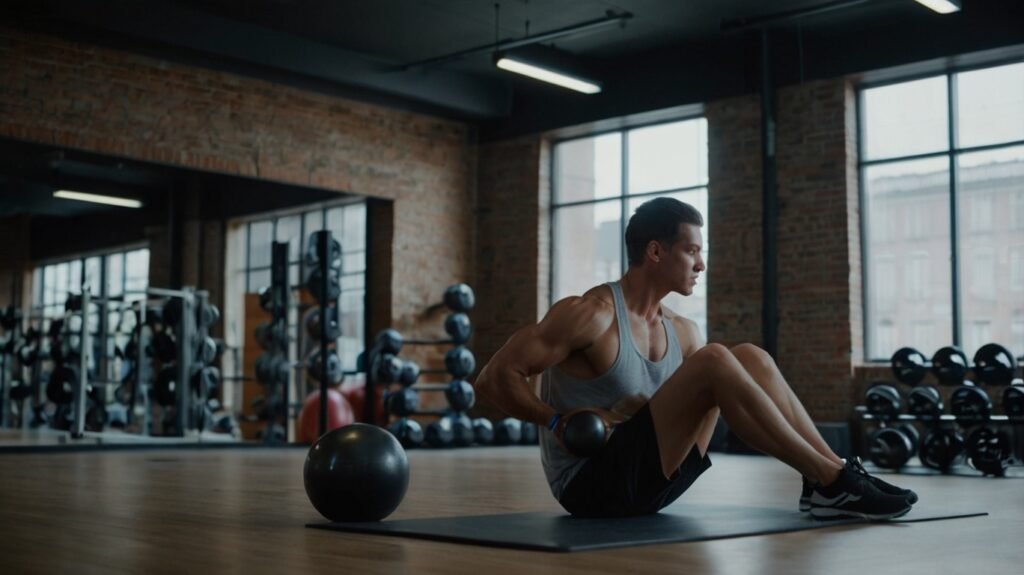
Benefits of Russian Twists:
- Improves core strength
- Enhances balance and stability
- Increases flexibility in the spine
The Russian Twist is not just about strength; it also helps in building athletic performance. Incorporating this exercise into your routine can lead to better results in various sports and activities.
3. Bicycle Crunch
The bicycle crunch is a fantastic exercise that works your entire core. This versatile, no-equipment exercise targets multiple muscle groups, burns calories, and helps you achieve a more defined, functional core. Here’s how to do it:
- Start Position: Lie on your back with your hands behind your head and legs raised at a 90-degree angle.
- Movement: Bring your right elbow towards your left knee while straightening your right leg. Switch sides, bringing your left elbow to your right knee.
- Repeat: Continue alternating sides in a smooth, controlled motion.
Benefits of Bicycle Crunches
- Engages multiple muscle groups
- Improves core strength
- Burns calories effectively
The bicycle crunch is not just about looking good; it’s about building a strong core that supports your overall fitness journey!
4. Dead Bug
The Dead Bug exercise is a fantastic way to build core strength and stability. It effectively engages the deep core muscles, including the transverse abdominis and pelvic floor, which are essential for overall fitness. Here’s how to do it:
- Start Position: Lie on your back with your arms extended towards the ceiling and your knees bent at a 90-degree angle.
- Movement: Slowly lower your right arm and left leg towards the floor while keeping your back flat. Return to the starting position and switch sides.
- Repetitions: Aim for 10-15 reps on each side.
Benefits of the Dead Bug Exercise
- Improves core strength
- Enhances stability
- Reduces the risk of injury
The Dead Bug is a simple yet effective exercise that can be done anywhere, making it perfect for all fitness levels. Incorporate it into your routine for better core engagement!
5. Mountain Climber
Mountain climbers are a fantastic exercise that works your core and gets your heart pumping. This exercise ramps up your heart rate and strengthens your core, whether you’re in a neutral position, incline plank position, or decline plank position. Here’s how to do them:
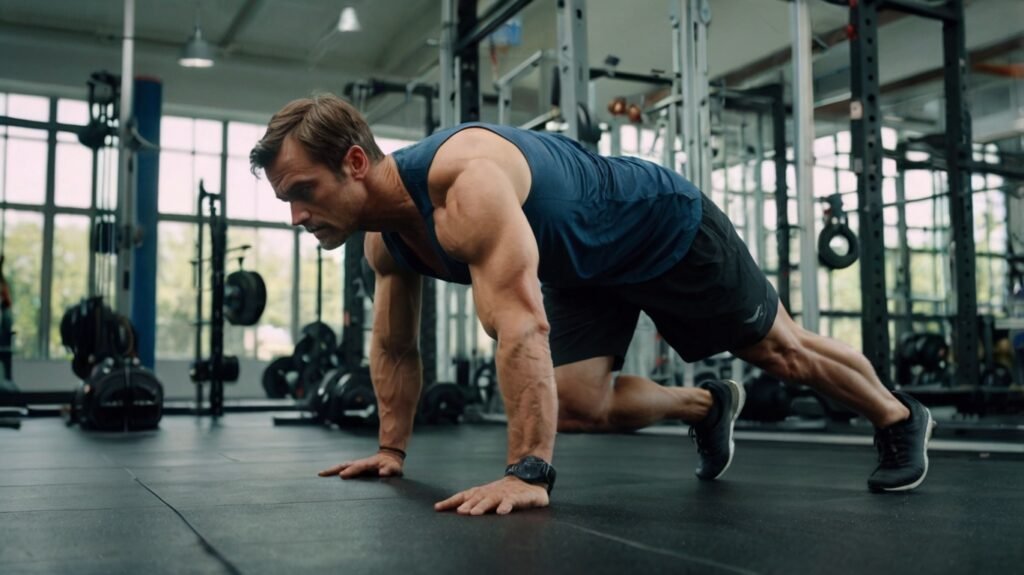
- Start in a plank position with your hands under your shoulders.
- Keep your body straight from head to heels.
- Quickly bring one knee towards your chest, then switch legs, like you’re running in place.
Benefits of Mountain Climbers
- Full-body workout: Engages multiple muscle groups.
- Cardio boost: Increases heart rate for better endurance.
- Core strength: Targets abdominal muscles effectively.
Mountain climbers are not just about speed; focus on maintaining good form to get the most out of this exercise.
Tips for Beginners
- Start slow to master the form.
- Use a mat for comfort.
- Gradually increase your speed as you get stronger.
Incorporate mountain climbers into your routine for a quick and effective workout!
6. Side Plank
The side plank is a versatile and effective exercise that offers numerous benefits for core strength, stability, and overall fitness. This exercise primarily targets the obliques, which are the muscles on the sides of your abdomen.
Benefits of Side Plank
- Improves core stability
- Strengthens the obliques
- Enhances balance and coordination
How to Perform a Side Plank
- Lie on your side with your legs straight and stacked on top of each other.
- Prop yourself up on your elbow, keeping it directly under your shoulder.
- Lift your hips off the ground, forming a straight line from your head to your feet.
- Hold this position for 20-30 seconds, then switch sides.
Practicing the side plank regularly can lead to better posture and reduced back pain.
Variations to Try
- Knee Side Plank: For beginners, keep your knees on the ground for support.
- Side Plank with Leg Lift: Raise the top leg while holding the plank for an extra challenge.
- Side Plank with Rotation: Rotate your torso and reach under your body for added core engagement.
7. Bird Dog
The Bird Dog exercise is a fantastic way to enhance your stability, balance, and coordination. It’s suitable for everyone, regardless of where you are in your fitness journey. Here’s how to do it:
How to Perform the Bird Dog
- Start on your hands and knees in a tabletop position.
- Keep your back flat and your core engaged.
- Slowly extend your right arm forward and your left leg back, keeping them in line with your body.
- Hold for a few seconds, then return to the starting position.
- Switch sides and repeat.
Benefits of the Bird Dog
- Improves core strength
- Enhances balance
- Helps with coordination
The Bird Dog is a great example of a core move that can help improve your stability, balance, and coordination—no matter where you are in your fitness journey.
Variations to Try
- Knee to Elbow: Bring your knee towards your elbow before extending.
- Weighted Bird Dog: Hold a light weight in your extended hand for added resistance.
- Bird Dog Crunch: Add a crunch by bringing your elbow and knee together before extending them again.
8. Flutter Kicks
Flutter kicks are a great exercise for building strength in your core and lower body. They can improve muscular endurance and help you stay active longer. Here’s how to do them:
- Lie on your back on a mat with your arms at your sides or under your hips for support.
- Lift your legs off the ground about 6 inches.
- Kick your legs up and down in a fluttering motion, keeping your core tight.
Benefits of Flutter Kicks
- Strengthens the core: Helps build a strong midsection.
- Improves flexibility: Increases range of motion in your legs.
- Enhances endurance: Trains your muscles to sustain activity over time.
Flutter kicks are not just about movement; they are about training your muscles to work together effectively. Regular practice can lead to better performance in other exercises and daily activities.
9. Hanging Leg Raise
The Hanging Leg Raise is a fantastic exercise for building core strength. It primarily targets your abdominal muscles and helps in improving your overall stability. Here’s how to perform it effectively:
Steps to Perform Hanging Leg Raises:
- Find a sturdy bar: Use a pull-up bar or any strong overhead bar.
- Hang with your arms extended: Grip the bar with both hands, letting your body hang freely.
- Lift your legs: Keeping your legs straight, raise them until they are parallel to the ground.
- Lower your legs slowly: Bring your legs back down without swinging.
Benefits of Hanging Leg Raises:
- Tones your core: This exercise is great for strengthening your abdominal muscles.
- Strengthens hip flexors: It helps in improving your hip flexor strength, which is important for many movements.
- Improves posture: By engaging your core, it can help in maintaining better posture.
Hanging Leg Raises are not just about strength; they also enhance your overall fitness and can help reduce lower back pain.
Important Tips:
- Start with bent knees if straight legs are too challenging.
- Focus on controlled movements to avoid injury.
- Incorporate this exercise into your routine 2-3 times a week for best results.
In summary, the Hanging Leg Raise is an excellent addition to any workout plan, especially for those looking to tone their core and improve their overall fitness.
10. Medicine Ball Slam
The medicine ball slam is a fantastic exercise that helps improve your upper body strength and power. This dynamic move combines strength training with a cardio workout, making it great for overall fitness. Here’s how to do it correctly:
- Start Position: Stand with your feet shoulder-width apart, holding a medicine ball above your head with both hands.
- Slam Down: Bend your knees slightly and slam the ball down to the ground as hard as you can, engaging your core.
- Catch and Repeat: As the ball bounces back, catch it and return to the starting position. Repeat for several reps.
Benefits of Medicine Ball Slams
- Boosts Power: This exercise is excellent for building upper body power.
- Full-Body Workout: It engages multiple muscle groups, including your arms, core, and legs.
- Improves Coordination: The movement helps enhance your hand-eye coordination.
Medicine ball slams are a great way to add variety to your workout routine while also improving your strength and endurance.
Tips for Proper Form
- Keep your back straight to avoid injury.
- Use your legs to generate power when slamming the ball.
- Focus on a controlled movement to maximize effectiveness.
Incorporating medicine ball slams into your routine can lead to significant improvements in your fitness level. They are suitable for all fitness levels, making them a versatile choice for anyone looking to enhance their workout.
11. Stability Ball Rollout
The Stability Ball Rollout is a fantastic exercise for building core strength. This move not only targets your abs but also helps strengthen your hip flexors. To perform this exercise, follow these steps:
- Start in a high-plank position with your hands on the stability ball.
- Slowly roll the ball forward, extending your body while keeping your core tight.
- Roll back to the starting position, engaging your abs throughout the movement.
Benefits of Stability Ball Rollout
- Strengthens core muscles: This exercise is great for your abdominal muscles.
- Improves balance: Using a stability ball helps enhance your overall stability.
- Engages multiple muscle groups: It works not just your abs but also your shoulders and back.
The Stability Ball Rollout is a great way to challenge your core and improve your overall fitness. This core exercise does double duty by strengthening the hip flexors and crunching your abs.
Tips for Success
- Keep your back straight to avoid injury.
- Start with smaller rolls if you’re a beginner.
- Gradually increase the distance as you get stronger.
Incorporating the Stability Ball Rollout into your routine can lead to significant improvements in your core strength and stability!
12. V-Up
The V-Up is a fantastic exercise for building core strength and improving balance. This intermediate-level move effectively targets the upper and lower abs, obliques, and hip flexors. Here’s how to perform it:
- Start Position: Lie flat on your back with your arms extended above your head and legs straight.
- Lift: Simultaneously raise your legs and upper body off the ground, reaching your hands towards your feet to form a ‘V’ shape.
- Hold: Keep your core tight and hold the position for a moment before lowering back down.
Benefits of V-Ups
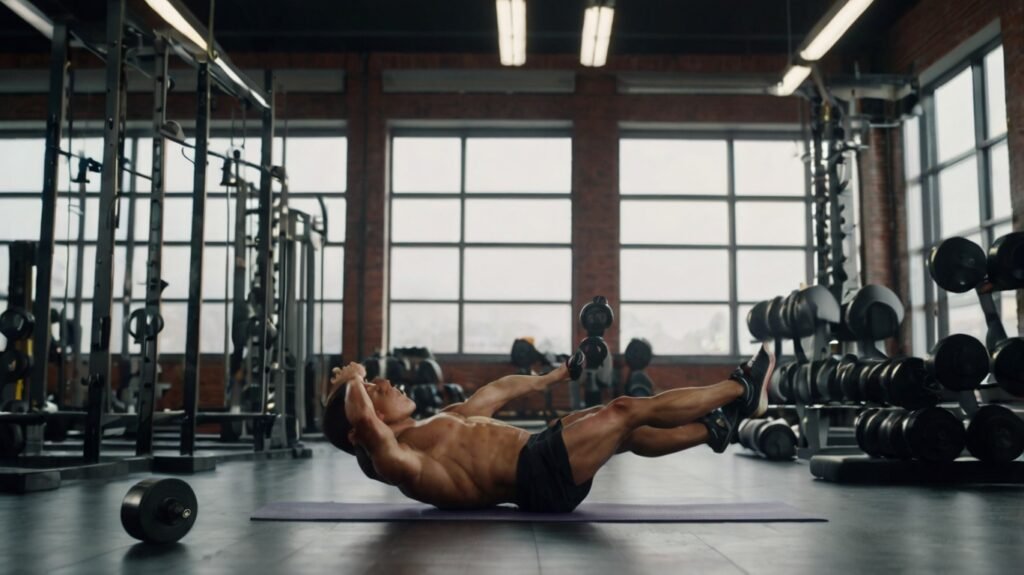
- Strengthens Core: Engages multiple muscle groups.
- Improves Balance: Helps with stability and coordination.
- Versatile: Can be modified for different fitness levels.
V-Ups are a great way to challenge your core and can be included in any workout routine. They not only build strength but also enhance your overall fitness.
Variations
- Bent Knee V-Up: Keep your knees bent for an easier version.
- Weighted V-Up: Hold a weight for added resistance.
- V-Up with Twist: Add a twist to engage your obliques more.
Incorporating V-Ups into your routine can lead to significant improvements in your core strength and overall fitness. This exercise is essential for anyone looking to enhance their core workout.
13. Ab Wheel Rollout
The Ab Wheel Rollout is a fantastic exercise for building core strength. It’s simple to do but very effective. Here’s how to perform it:
- Start Position: Kneel on the floor and hold the ab roller with both hands.
- Roll Out: Slowly roll the wheel forward, extending your body. Keep your back straight and core tight.
- Return: Pull the wheel back towards you, using your core muscles to control the movement.
Benefits of the Ab Wheel Rollout
- Strengthens Core: This exercise is endorsed by strength trainers for effective core and abdominal strength training.
- Improves Stability: It helps in enhancing overall body stability.
- Engages Multiple Muscles: Works not just the abs but also the shoulders and back.
Tips for Success
- Start Slow: If you’re new, don’t roll out too far at first.
- Keep Your Form: Always maintain a straight back to avoid injury.
- Breathe: Remember to breathe out as you roll out and in as you return.
The ab wheel is a great tool to help you achieve a stronger core and six-pack muscles.
Incorporating the Ab Wheel Rollout into your routine can lead to significant improvements in your core strength and overall fitness!
14. Reverse Crunch
The reverse crunch is an excellent exercise for building your abs and improving your overall balance and stability—no equipment needed! This move targets your lower abs, making it a great addition to any workout routine.
How to Do a Reverse Crunch:
- Start Position: Lie on your back with your arms at your sides. Bend your knees and lift your feet off the ground, keeping your thighs perpendicular to the floor.
- Lift Your Hips: Use your abs to pull your knees toward your chest while lifting your hips off the ground. Hold for a moment at the top.
- Lower Back Down: Slowly lower your hips and legs back to the starting position without letting your feet touch the ground.
Benefits of Reverse Crunch:
- Strengthens lower abs
- Improves core stability
- Can be done anywhere
The reverse crunch is a simple yet effective way to enhance your core strength. It’s perfect for all fitness levels!
15. Woodchopper
Overview
The woodchopper is a fantastic exercise that targets your core while also working your arms and legs. It mimics the motion of chopping wood, which is why it’s named that way. This exercise can be done with a medicine ball, dumbbell, or even just your body weight.
Benefits
Here are some of the top benefits of doing woodchoppers:
- Improves posture: Helps you stand tall and straight.
- Builds core strength: Engages your abdominal muscles effectively.
- Boosts cardiovascular fitness: Gets your heart pumping.
- Burns calories: A great way to lose weight while having fun.
How to Perform Woodchoppers
- Start Position: Stand with your feet shoulder-width apart, holding a weight in both hands.
- Chop Down: Rotate your torso and bring the weight down towards your right hip.
- Lift Up: In one smooth motion, lift the weight diagonally across your body to your left shoulder.
- Repeat: Do this for 10-15 reps, then switch sides.
The woodchopper is not just about strength; it also helps with coordination and balance. From improving posture and core strength to boosting cardiovascular fitness and burning calories, the benefits of woodchoppers are numerous.
Tips for Success
- Keep your core tight throughout the movement.
- Use a weight that feels comfortable but challenging.
- Focus on smooth, controlled movements to avoid injury.
Incorporating woodchoppers into your routine can lead to a stronger core and better overall fitness!
16. Lying Leg Raise
Lying leg raises are a fantastic exercise for building core strength. This move specifically targets the upper and lower abdominal muscles, making it a great addition to any workout routine. Here’s how to do it:
- Start Position: Lie flat on your back with your legs straight and arms at your sides.
- Lift: Slowly raise your legs towards the ceiling, keeping them straight.
- Lower: Gently lower your legs back down without touching the floor.
Benefits of Lying Leg Raises
- Improves core strength
- Targets both upper and lower abs
- No equipment needed, just a mat
Lying leg raises are simple yet effective. They help in building a strong core, which is essential for overall fitness and stability.
Tips for Success
- Keep your lower back pressed against the floor to avoid strain.
- Perform 3 sets of 10-15 repetitions for best results.
- Breathe out as you lift your legs and breathe in as you lower them.
Incorporating lying leg raises into your routine can lead to rock-solid abs and improved overall fitness!
17. Side Crunch
The side crunch is a great exercise for targeting your oblique muscles. This move helps you build a strong core and can improve your overall stability. Here’s how to do it:
- Start Position: Lie on your side with your legs stacked on top of each other. Place your lower arm under your head for support.
- Crunch Up: Use your oblique muscles to lift your upper body towards your hips. Keep your legs together and your feet on the ground.
- Return: Slowly lower your body back to the starting position.
Benefits of Side Crunches
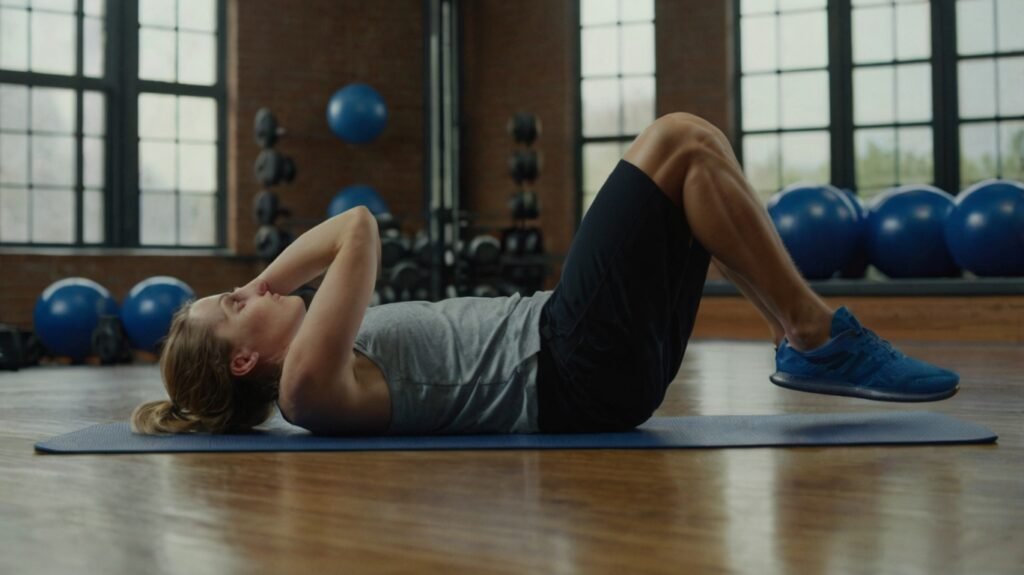
- Targets Obliques: This exercise focuses on the muscles on the sides of your abdomen.
- Improves Stability: A strong core helps with balance and stability in other exercises.
- Sculpt Your Waistline: Regular practice can help you achieve a more defined waist.
The side crunch is a fantastic exercise that targets the oblique muscles, helping you sculpt a well-defined waistline and improve core stability.
Tips for Success
- Keep your movements controlled to avoid injury.
- Breathe out as you lift your body and breathe in as you lower it.
- Start with a few repetitions and gradually increase as you get stronger.
18. Toe Touches
Toe touches are a great exercise for strengthening your core and improving flexibility. This exercise targets your abdominal muscles and helps with overall body coordination.
How to Perform Toe Touches:
- Lie on your back with your legs straight up in the air.
- Reach your hands towards your toes, lifting your shoulders off the ground.
- Hold for a moment, then lower back down.
Benefits of Toe Touches:
- Improves core strength
- Enhances flexibility
- Increases coordination
Toe touches are simple yet effective. They can be done anywhere and are perfect for all fitness levels.
Tips for Success:
- Keep your movements controlled to avoid injury.
- Focus on your breathing; exhale as you reach up.
- Start with a few repetitions and gradually increase as you get stronger.
Incorporating the push-up toe touch into your workout routine can help improve your upper body and core strength, enhance overall muscular endurance, and more!
19. Plank Jacks
Plank jacks are a great way to work your core while also getting your heart rate up. This exercise combines strength and cardio to help you build endurance and stability.
How to Do Plank Jacks:
- Start in a high plank position with your hands under your shoulders.
- Keep your body in a straight line from head to heels.
- Jump your feet out wide, then back together, like a jumping jack.
- Repeat for a set amount of time or reps.
Benefits of Plank Jacks:
- Improved stability: Helps strengthen your core.
- Enhanced muscular endurance: Great for building stamina.
- Increased calorie burn: A fun way to get your heart pumping.
Plank jacks are not just about strength; they also boost your heart rate, making them a fantastic addition to any workout routine!
20. Seated Leg Tucks
Seated leg tucks are a fantastic exercise for building core strength. This move targets your abdominal muscles and helps improve your overall stability. Here’s how to do it:
- Sit on the floor with your legs extended in front of you.
- Lean back slightly while keeping your back straight.
- Bend your knees and pull them towards your chest, then extend them back out without touching the ground.
Benefits of Seated Leg Tucks
- Improves core strength
- Enhances balance and stability
- Can be done anywhere, no equipment needed
Tips for Success
- Keep your movements controlled to avoid injury.
- Focus on your breathing; exhale as you tuck your legs in.
- Start with a few repetitions and gradually increase as you get stronger.
Seated leg tucks are a simple yet effective way to strengthen your core. Incorporating the dumbbell seated tuck crunch on the floor into your workout routine can help improve core strength, stability, and overall abdominal definition.
Try adding this exercise to your routine for a solid core workout!
21. Cable Woodchopper
The Cable Woodchopper is a fantastic exercise for targeting your obliques, the muscles located on the sides of your abdomen. This exercise simulates the action of chopping wood, making it both fun and effective. Here’s how to do it:
- Set Up: Attach a handle to the high pulley of a cable machine.
- Position: Stand with your feet shoulder-width apart, facing the machine. Grab the handle with both hands, arms extended above your head.
- Chop Down: Rotate your torso and pull the handle down diagonally across your body, ending near your hip.
- Return: Slowly return to the starting position and repeat.
Benefits of Cable Woodchopper
- Strengthens your core, especially the obliques.
- Improves rotational strength, which is useful in many sports.
- Can be adjusted for different fitness levels by changing the weight.
Tips for Success
- Keep your core tight throughout the movement.
- Avoid using your arms too much; focus on your core muscles.
- Perform 3 sets of 10-15 repetitions on each side.
The Cable Woodchopper is an excellent exercise for working the obliques, the muscles on the sides of your abdomen. This exercise mimics the movement of chopping, making it both engaging and effective!
22. Stability Ball Pass
The Stability Ball Pass is a fantastic exercise for building core strength and stability. This exercise not only targets your abdominal muscles but also engages your back and hip muscles, making it a great full-body workout. Here’s how to do it:
- Start Position: Lie on your back with your legs extended and hold a stability ball between your hands.
- Pass the Ball: Lift your legs and arms at the same time, passing the ball from your hands to your feet.
- Return: Lower your arms and legs back to the starting position, keeping the ball held between your feet.
Benefits of Stability Ball Pass
- Improves Core Strength: Engaging multiple muscle groups helps build a strong core.
- Enhances Balance: Using a stability ball challenges your balance and coordination.
- Increases Flexibility: This exercise can help improve your overall flexibility.
The Stability Ball Pass is a fun way to boost your core workout and can be adjusted for different fitness levels.
Tips for Success
- Start with a lighter ball if you’re new to this exercise.
- Focus on controlled movements to avoid injury.
- Keep your back flat against the ground throughout the exercise.
Incorporating the Stability Ball Pass into your routine can help you achieve a stronger core and improve your overall fitness. Remember to listen to your body and adjust as needed!
23. Kettlebell Swing
The kettlebell swing is a fantastic exercise that targets your core while also working your legs and back. This dynamic movement helps to build strength and endurance. Here’s how to do it:
- Start Position: Stand with your feet shoulder-width apart, holding a kettlebell with both hands in front of you.
- Swing: Bend your knees slightly and hinge at your hips to swing the kettlebell back between your legs.
- Drive: Push your hips forward to swing the kettlebell up to shoulder height, keeping your arms straight.
Benefits of Kettlebell Swings
- Core Strength: Engages your abs and lower back.
- Cardio: Increases heart rate for better fitness.
- Flexibility: Improves hip movement.
The kettlebell swing is a great way to blast your abs while also enhancing your overall fitness. It’s a versatile exercise that can be adjusted for any fitness level.
24. Side-Lying Leg Lift
The Side-Lying Leg Lift is a great exercise for strengthening your hips and thighs. This move mainly works the outer hip muscles, also known as the abductors. Here’s how to do it:
- Lie on your side with your legs straight.
- Keep your bottom leg flat on the ground.
- Lift your top leg up towards the ceiling, keeping it straight.
- Lower it back down without letting it touch the bottom leg.
Benefits of Side-Lying Leg Lifts
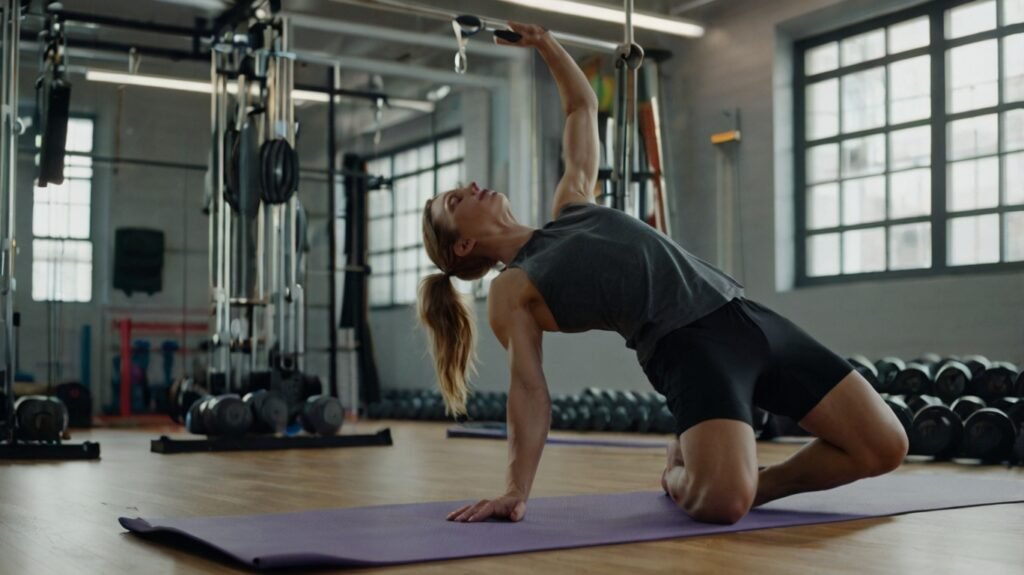
- Strengthens hip muscles
- Improves balance
- Can be done anywhere
This exercise is perfect for all fitness levels and can be modified easily.
Tips for Success
- Keep your core tight to maintain balance.
- Avoid rolling your hips forward or backward.
- Perform 10-15 repetitions on each side for best results.
Variations
- Try adding ankle weights for extra resistance.
- You can also do small circles with your leg to target different muscles. The side lying leg circle is a fantastic exercise that targets the outer hip and thigh muscles, also known as the abductors and adductors.
25. And More
When it comes to core exercises, there are countless options to explore. Incorporating a variety of movements can help you build strength and stability. Here are some additional exercises to consider:
- Single-arm push press: This exercise not only works your core but also engages your shoulders and arms.
- Glute bridge march: A great way to activate your glutes while keeping your core tight.
- Kettlebell bridge pullover: This combines a bridge with a pullover, targeting multiple muscle groups.
Quick Tips for Core Training
- Focus on form: Proper technique is crucial to avoid injury.
- Mix it up: Try different exercises to keep your routine fresh and exciting.
- Listen to your body: If something feels wrong, stop and reassess your form.
Remember, consistency is key! Regular practice will lead to better results over time.
In summary, there are many ways to strengthen your core. Whether you prefer traditional exercises or more dynamic movements, the important thing is to find what works best for you. Keep challenging yourself and enjoy the journey to a stronger core!
Conclusion
In summary, core exercises are important for everyone, no matter your fitness level. They help improve balance, stability, and strength, making everyday activities easier. Whether you are a beginner or more advanced, there are plenty of exercises to choose from. Remember to start slow and focus on your form to avoid injury. By including these core workouts in your routine, you can build a strong foundation for all your fitness goals. So, get started today and enjoy the benefits of a stronger core!
Explore Effective Sports Psychology Techniques to Boost Your Fitness Mindset
FAQs
What are core exercises?
Core exercises are workouts that strengthen the muscles in your stomach, back, and sides. They help you stay balanced and support your body during other activities.
Why are core exercises important?
Core exercises are important because they help improve your balance and stability. A strong core can also make everyday activities easier and help prevent injuries.
Can beginners do core exercises?
Yes, beginners can definitely do core exercises! There are many simple moves that anyone can try, like the plank or the dead bug.
How often should I do core workouts?
You can do core workouts about 2 to 3 times a week. Just make sure to give your muscles time to rest between workouts.
What equipment do I need for these exercises?
You don’t need much equipment for core exercises. Many can be done using just your body weight. Some exercises might use a stability ball or a medicine ball.
Can core exercises help with back pain?
Yes, strengthening your core can help reduce back pain. A strong core supports your spine and can help you avoid discomfort.

